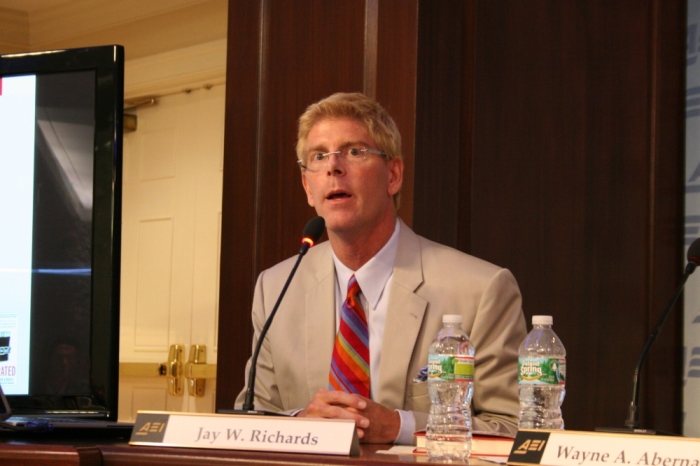Do Libertarians Need God? Apologist Says Theism Necessary for Freedom, Human Rights

WASHINGTON – The ideas behind individual freedom, personal responsibility, and basic human rights require something more than materialism, a Christian scholar argued.
"The easiest way to avoid sawing off the branch you sit on as a libertarian is to be a theist," Jay Richards, distinguished fellow at the Institute for Faith, Work, and Economics and author of the book Money, Greed, and God: Why Capitalism is the Solution and Not the Problem, told an audience of about 80 people at Ebenezer's Coffeehouse near Capitol Hill on Thursday.
Richards argued that the basic truths behind the Declaration of Independence and the political theory of libertarianism require a theistic worldview. Materialism, by contrast, fails to provide the necessary foundation for freedom, responsibility, reason, and moral truth, he contends. These four bedrock beliefs – that human beings have free will and are responsible for their actions, that they can reason and come to a knowledge of truth, and that there is objective morality in the world – are fundamental to a libertarian understanding, he claimed.
"Theism doesn't mean you believe God has a white beard," Richards quipped. Rather, it designates belief in "a self-existent, transcendent, good, purposeful, and free agent created the universe and everything other than God." Christians are theists, but Richards did not argue that you have to be Christian to believe in individual rights.
The scholar defined materialism as the belief that there is no God and everything is matter in motion with no purpose. He quoted Karl Sagan, who argued that "the cosmos is all there is, or ever was, or ever will be." On these grounds, individual rights and limited government do not make sense, Richards claimed.
To prove this, the scholar quoted actual materialists who doubted the fundamental tenets of freedom.
He started with the atheist B. F. Skinner, who wrote that "autonomous man has been constructed from our ignorance…and as our understanding increases, the very stuff of which he is composed vanishes." Skinner claimed that there is no free will or morality, but all human actions are determined by natural causes.
Richards also quoted the outspoken atheist Bertrand Russell. "When a man acts in ways that annoy us we wish to think him wicked, and we refuse to face the fact that his annoying behavior is the result of antecedent causes which, if you follow them long enough, will take you beyond the moment of his birth and therefore to events for which he cannot be held responsible by any stretch of the imagination," Russell wrote, claiming that man has no responsibility for his actions.
To stress his point further, Richards even quoted Charles Darwin, who doubted man's ability to reason since he thought humans descended from the lower animals. "With me the horrid doubt always arises whether the convictions of man's mind, which has been developed from the mind of the lower animals, are of any value or at all trustworthy," Darwin wrote. "Would any one trust in the convictions of a monkey's mind?"
Logically, Richards explained, if humans evolved through natural selection, our minds adapted not to know the truth, but to keep us alive. He quoted Patricia Churchland, explaining that when it comes to natural selection choosing the reasons for adaptations, "truth, whatever that is, definitely takes the hindmost," compared to survival and reproduction.
Richards also quoted self-proclaimed atheist Alex Rosenberg, who declared that "the notion that thoughts are about stuff is illusory." The scholar explained that Rosenberg would "say with a straight face that he wrote a book that isn't about anything, just a result of chemical reactions."
Richards suggested that a theistic worldview provides better ground for the principles of libertarianism, the Declaration of Independence, and basic sanity. "Not everyone has perfect access to natural law, but it still lets people understand that murder is wrong," he explained. This view of Natural Law, rooted in Christian thinkers like Thomas Aquinas, forms a better defense for the individual rights we take for granted in America, the scholar argued.
According to the Public Religion Research Institute's 2013 American Values Survey, 78 percent of self-identified "Libertarians" do not identify with the Christian Right.
"But there is a difference between Christian and Christian Right," a Christian conflicted with the libertarian label who asked not to be identified told The Christian Post on Friday. "Many people, especially young people, are embracing libertarian principles such as economic freedom and personal responsibility, but are hesitant to label themselves libertarians because of some of the negative stigmas attached."




























